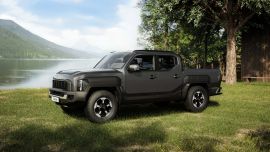Former Colombian rebels are returning to mountain strongholds where they once fought to the death, this time to campaign in the first elections held under a peace accord that ended a 50-year insurgency.
They were greeted with hugs and red roses as they made their way up the slopes of the Cauca Valley in southwest Colombia.
One of them is Pablo Catatumbo, who fought for the Revolutionary Armed Forces of Colombia starting in 1973. Now, he is 65 and looked after by a detail of 40 men -- some ex-rebels and some former adversaries.
Under the peace accord reached in late 2016 that led to the FARC's disarming, the former rebels are guaranteed at least 10 of the 268 congressional seats up for grabs in the March 11 election.
But they can gain even more, so former rebel leaders are out trying to win votes.
On this chilly day a caravan of 10 vehicles heads up into the mountains along a road leading to the villages of Monteloro and Santa Lucia.
Descending from an armored truck is Catatumbo, who came to this strategic area in the 1990s with many FARC troops and a stern warning: "No one leaves here."
The area was important: right wing paramilitaries wanted to seize it because the land connects with the Pacific coast, from which tons of cocaine were shipped to the United States.
"At any time, you could be killed," said Reinaldo Montoya, a 58 year old farmer, recalling massacres, battles and the fear of being executed on suspicion of fighting for the wrong side: the army, the guerrillas, or paramilitary groups helping to combat the latter. They all had guns.
Montoya, who lost several cousins in the war, says he is not guaranteeing he will vote for the rebels but wishes them well.
"That will encourage them to stay calm. Not to go back to war, let's say."
‘They love us’
Catatumbo moves forward amid a clutch of farmers and merchants waving small flags of the Alternative Revolutionary Force of Colombia, as the rebels' party is now known, with a red rose as its symbol and still the same Spanish acronym, FARC.
Catatumbo wears a white jacket that hides his ample belly. It's been 10 years since he last came to these fertile cattle- raising lands, and now he asks about people he used to know.
In Colombia today there are few places where a campaign poster with his face could be put up. Not everyone is thrilled about seeing former rebel commanders who are now candidates for office. Some have been greeted with insults, rocks and eggs.
Trailing in the polls, the FARC decided to stop holding large public rallies. The animosity towards them, paradoxically, is strongest in towns that were spared the most by the war. Security has been stepped up for FARC candidates.
Catatumbo told AFP that this bad blood stems from a paid campaign of "political bullying" based on the notion that no one wants to see the FARC in Congress.
Marco Calarca, another former FARC commander, said this campaign is aimed at making people behave "as if the war had never ended and therefore we cannot get into politics legally." The pain of the 50-year war is still quite raw.
But "here people recognize us. They love us because during the years of the war we defended this territory," said Catatumbo.
Under the peace accord, the FARC -- once the most powerful rebel army in Latin America -- disarmed its 7,000 fighters in order to join the legal political process, agreed to confess to wartime crimes and pay reparations to victims.
If they live up to these pledges, leaders such as Catatumbo will be able to serve sentences other than prison time and take seats in the legislature.
This infuriates many Colombians, in particular the right wing, which is vowing to win presidential voting later in May and come to power to amend the peace accord.
War 'easier' than peace
In Monteloro, Catatumbo remembered fallen rebel fhters and people killed by his troops. He denounced what he called a political elite that he said fanned the flames of war but never fought in it. And he asked for forgiveness.
Ever Rivera, a 50-year-old coffee grower, listened to Catatumbo for the 40 minutes he spoke. Like many in this area, he saw a lot of people killed by the FARC in its battle to seize power in Colombia.
"They would kill people and you would never know why," said Rivera. Still, he said he would vote for the FARC because it is a new party and "has seen more than anyone how farmers suffer." The war began in the 1960s as a revolt by poor peasants.
In Santa Lucia, a three hour drive from Monteloro, dozens of people also heard Catatumbo ask for forgiveness and promise not to go back to war.
At one point he hugs a police chief -- something Colombians are not used to seeing. But Catatumbo insists it is hard to do politics after laying down weapons in a country traditionally ruled by conservatives.
"I am almost convinced it was easier to make war than peace," he said as police guarding him exchange glances. "Colombia is a very reactionary country."
- AFP


















Comments